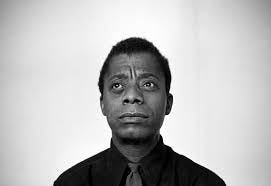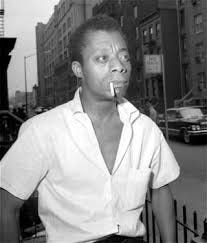James Baldwin was nothing if not the American consciousness writ large.
Neither a dry pedant nor a rigid political theorist, he was arguably more persuasive than any essayist in the post-War world.
Baldwin argued, both in his fiction and non-fiction, that the inextricable interdependence of whites and blacks, forced a rejection of a black/white racial binary. His writings were fulminations against untruths and hypocrisy and he argued for racial agitation as a means of authenticity, not violence.
American history, Baldwin contended, was deluded by its own, pervasive and deceitful mythology. A onetime teenage preacher, he eventually shunned Christianity for its complicity in white racism, but he nonetheless interpolated the flourished cadences and brandished morality of the proverbial church pastor, if only to uncloak the American psyche. He spent years tearing the scabs off of our racial wounds, in order to let them bleed again. He had no time for hollow, patriotic pap like “liberty and justice for all” so long as the dehumanizing effects of American apartheid sabotaged our national integrity.
Baldwin loved America even as he left it for Europe, even as it consistently broke his heart.
In The Fire Next Time, his 1962 duet of essays (“My Dungeon Shook- Letter to my Nephew on the One Hundredth Anniversary of Emancipation” and “Down at the Cross- Letter from a Region of my Mind”), Baldwin offered up a bluesy, furious contemplation on America’s racial disunion. Baldwin demands equality and freedom, not merely as practical solutions, but as essential ingredients for the purification of the American soul. America was morally and spiritually corrupted, Baldwin averred, and the nation was enabling its own national betrayal by hewing to a despotic, racialist narrative. He urgently pilloried “The American Dream” as a “nightmare on the private, domestic, and international levels,” and Baldwin was aghast that a nation could champion freedom abroad, while suppressing liberty at home. Racism in America was evidence of a deeper, marrowed panic, by turns existential and sexual. Black aspirations would be thwarted, so long as the country remained stunted in its own adolescence.
Though a young Baldwin may have dreamed that his world could be akin to that of his white counterparts, a 14 year old Baldwin quickly realized the impotency of ostensibly“democratic” principles which didn’t apply to him. As he recalls:
“The fear that I have heard in my father’s voice … when he realized that I really believed I could do anything as a white boy could do, and had every intention of proving it, was not at all like the fear I heard when one of us was ill or had fallen down the stairs or strayed too far from the house. It was another fear, a fear that the child, in challenging the white world’s assumptions, was putting himself in the path of destruction.”
Baldwin invested his writings with fierce political urgency, but it wasn’t politics or law, however, which animated his bravura insights. He sermonized as perceptively about the myths of masculinity as he did the lies of racial innocence. Self-realization was both crucial to the elimination of racist attitudes, but also significant on its own terms. An understanding of oneself necessitates and fosters an understanding of others, and Baldwin frequently lamented a people who seemed unwilling or unable to uncork their own deeper recesses.
Formal equality could not be achieved by an intellectual understanding of political theory, but rather by a psychological understanding of oneself. By not understanding oneself, Baldwin argued, established political attitudes sublimated themselves into personal beliefs, often deviously. Baldwin observes such a phenomenon below:
“The person who distrusts himself has no touchstone for reality-for this touchstone can be only oneself. Such a person interposes between himself and reality nothing less than a labyrinth of attitudes. And these attitudes, furthermore, though the personas usually unaware of it (is unaware of so much!), are historical and public attitudes. They do not relate to the present any more than they relate to the person. Therefore, whatever white people do not know about Negroes reveals, precisely and inexorably, what they do not know about themselves.”
“Do I really want to be integrated into a burning house? Baldwin asks, but he was no racial separatist. His questions push well past the boundaries of political theory and into the realm of flesh and blood. The rational jargon of compromise, consensus and interest groups remained political ideals, but were inadequate in addressing deeper, more personal questions. Baldwin made the personal political, to be sure, and his musings were more than tinged with melancholy. As a black and gay man, the personal couldn’t just be political. There had to be a moral imperative behind it all, and clinical notions of rights and property war far too narrow to address the sprawling moral canvas of racial inequality. But Baldwin argues for acceptance rather than despair. Revealingly, Baldwin’s meeting with Nation of Islam leader, Elijah Muhammed, while stimulated by talk of freedom and personal responsibility, registers as ultimately an anti-white political tract within the binary racial construct which he readily rejected. In Baldwin’s purview, the interdependence of blacks and whites renders a country segregated by any color, antithetical to larger ideas of freedom itself.Notions that black nationalistic governments or liberal, propertied “integrated” societies could or should exist as separate entities are fantastical, and in Baldwin’s thinking, farcical on their face. In other words, actual freedom is predicated upon truth not as manmade, divisive constructs, but with an eye toward our own mortality.
Baldwin isn’t relinquishing the need to recognize race- to the contrary, he is mourning the gulf between democratic rhetoric and actual democracy.
Human suffering and vulnerability is only ameliorated through love and community, and a fractured community bears an unfathomable psychic toll on those who have fallen through the cracks. As Baldwin theorizes:
“All of us know, whether or not we are able to admit it, that mirrors can only lie, that death by drowning is all that awaits one there. It is for this reason that love is so desperately sought and so cunningly avoided. Love takes off the masks that we fear we cannot live without and know we cannot live within. I use the word “love” here not merely in the personal sense but as a state of being, or a state of grace-not in the infantile American sense of being made happy but in the tough and universal sense of quest and daring and growth. … In short, we, the black and the white, deeply need each other here if we are really to become a nation-if we are really, that is, to achieve our identity, our maturity, as men and women. To create one nation has proved to be a hideously difficult task; there is certainly no need now to create two, one black and one white.”
In light of Baldwin’s experience as a black man in Harlem and elsewhere, Baldwin’s own life exemplified how racial politics far transcended the theoretical. Above all, Baldwin experienced and expounded upon the idea that the personal and political were inseparable, not as concepts but realities. Racial domination both strangles the oppressor and the victim, and national motifs like American exceptionalism both obscure and make translucent the realities of history. Life was finally tragic, in Baldwin’s reckoning, even though society chose, perhaps unwittingly, to deny the fact of death. Baldwin appraised that the root of human trouble found its potential answer in the way in which we imprison ourselves. As he testifies,
“Perhaps the whole root of our trouble, human trouble, is that we will sacrifice all the beauty of our lives, will imprison ourselves in totems, taboos, crosses, blood sacrifices, steeples, mosques, races, armies, flags, nations, in order to deny the fact of death, which is the only fact we have.”
For African-Americans, freedom felt like an abstraction, and no amount of salesmanship could convince he and his fellow black countrymen otherwise. He takes more than a negative view of American exceptionalism. The persistence of African-American oppression severely strained credulity, with regard to any and all notions of American exceptionalism. Baldwin proclaims such sentiments persuasively:
“The American Negro has the great advantage of having never believed the collection of myths to which white Americans cling: that their ancestors were all freedom-loving heroes, that they were born in the greatest country the world has ever seen, or that Americans are invincible in battle and wise in peace, that Americans have always dealt honorably with Mexicans and Indians and all other neighbors or inferiors, that American men are the world’s most direct and virile, that American women are pure… And perhaps this attitude, held in spite of what they know and have endured, helps to explain why Negroes, on the whole, and until lately, have allowed themselves to feel so little hatred. … When one knows this about a man, it is impossible for one to hate him, but unless he becomes a man-becomes equal-it is impossible for one to love him.”
How white do you have to be to not be black? This remained a primary question James Baldwin endlessly pondered, and he cogently reminded us how it was impossible not to be both. To his enduring credit, Baldwin defied doctrinaire ideological thinking. And while he doesn’t propose policy prescriptions per se, Baldwin employed the power of language to not only inform, but re-shape the dialogue. Freedom and equality should have never been abstractions, and Baldwin attempts to supplant a moral framework that suitably addresses and acknowledges the chasm between ostensibly democratic principles and overt discriminatory practices.
American political thought was, for Baldwin, a language devoid of meaning, if individuals lacked the moral agency to define and disentomb their homeland’s frequently painful subtext. There could be no innocence and certainly no exceptionalism so long as America obstinately adhered to its own mythology.
In many ways, Baldwin challenged reductive definitions of victimhood by arguing that victims of racial subjugation were not merely aggrieved, but thoroughly dehumanized. By linking more generalized claims about racial oppression to the individual wounds inflicted by racial domination, Baldwin could refute haloed, nationalistic claims about American democracy itself. His writings never ceased to castigate the sins of racism, but Baldwin also never completely despaired. Later achievements in the Civil Rights movement (i.e. The Civil Rights Act of 1964, The Voting Rights Act of 1965, and the Fair Housing Act of 1968, to name concrete legislative advancements,) were hardly inconsequential, but they were less impactful on consciousness than they were on structure, in Baldwin’s mind. To be sure, even among his more dire forewarnings about racial cleavage in “The Fire Next Time,” Baldwin resisted complete hopelessness. For Baldwin could only discern a reality he saw all too limpidly and while the realities were painful, yet he never stopped imploring us to dream differently:
“… Color is not a human or a personal reality; it is a political reality. … For the sake of one’s children, in order to minimize the bill that they must pay, one must be careful not take refuge in any delusion. I know that what I am asking is impossible. But in our time, as in every time, the impossible is the least that one can demand-and one is, after all, emboldened by the spectacle of human history in general, and American Negro history in particular, for it testifies to nothing less than the perpetual achievement of the impossible.”
If you enjoyed this essay about the great James Baldwin, now is a great time to upgrade to become a paid subscriber! You’ll receive exclusive essays, early access to episode drops, behind the scenes footage, many prompts to register to vote, endless reasons why NOT to vote for Trump and much more. Join us on the wild ride to November as we fight to save democracy one Substack and episode at a time.







